Ginger and Erectile Dysfunction: Uses, Benefits, and Impact on Sexual Health
Written by Dr. Deepali Anand

Dr. Deepali is a medical writer and healthcare professional with a background in clinical surgery and patient care. Having transitioned from active clinical practice to medical communications, she specializes in bridging the gap between complex clinical data and patient education. Dr. Deepali is dedicated to creating evidence-based content that is grounded in scientific rigor and empathy, ensuring that sensitive topics like sexual wellness and mental health are accessible and empowering for every reader.
•
October 8, 2025
Our experts continually monitor the health and wellness space, and we update our articles when new information becomes available.
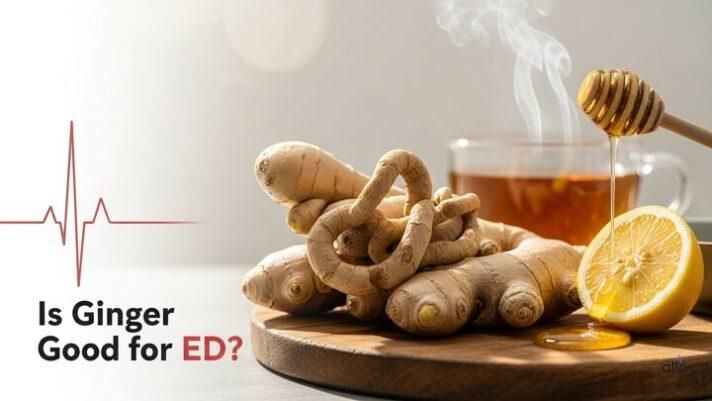
Quick Read
Ginger may support erectile function by improving blood flow, boosting nitric oxide production, reducing inflammation, and potentially increasing testosterone levels — all factors that play a role in healthy erections. While traditional use and early research (mostly animal studies) show promise, human evidence remains limited, with only a few small trials suggesting benefits. Ginger is generally safe at 1–4 grams daily through tea, food, or supplements, though those on blood thinners or with certain health conditions should consult a doctor first. Ginger can be a valuable part of your sexual health strategy alongside proper medical treatment, exercise, and stress management, but it's not a standalone solution for ED.
Ginger and erectile dysfunction are often linked because ginger may help improve blood flow, nitric oxide levels, and testosterone, which all support healthy erections. But while ginger can be a helpful natural aid, it’s not a cure for ED. Most of the evidence comes from animal studies, so more human research is needed.
In this article, we’ll explore what the evidence says about ginger and erectile dysfunction, how it may affect your body, the safest ways to use it, and what to expect if you decide to include it in your sexual wellness routine.
Is Ginger Good for Erectile Dysfunction?
Ginger(Zingiber officinale) is a spice long valued for its flavor and medicinal properties, and has also been used traditionally as a natural aphrodisiac. Some research suggests that ginger may support men’s sexual health by improving blood flow and overall sexual function.
But, when it comes to the specific question “Is ginger good for erectile dysfunction?”, the evidence is still limited. While some studies show that ginger and erectile dysfunction may be connected through its ability to enhance blood circulation and reduce inflammation, more human-based research is needed to confirm these benefits.
According to Allo Health, nearly 1 in 2 men experience erectile dysfunction, which is based on our internal clinical data of more than 2.5 lakh patients who have visited our clinics.
Let’s take a closer look at how ginger might influence erections and sexual performance.
Allo asks
How confident are you in natural remedies like ginger for improving erections?
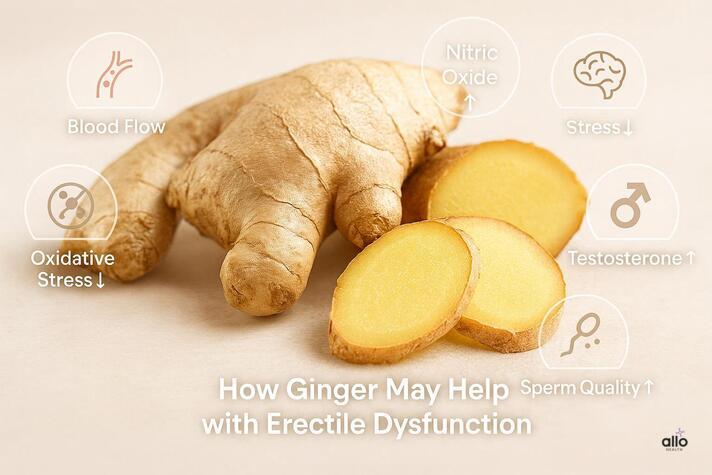
How Ginger Might Help with Erectile Dysfunction
1. Improves Blood Flow
Healthy blood flow is key to achieving and maintaining an erection. Ginger may help by relaxing blood vessels and improving overall blood flow throughout the body.
Animal and laboratory studies[1] have found that ginger supports widening of blood vessels(vasodilation ) and may even help prevent blood clots.
Because of this, ginger can also benefit conditions like high blood pressure and heart disease, both of which can interfere with proper blood flow to the penis.
2. Boasts Nitric Oxide Production
Nitric oxide is a crucial molecule for erections. It helps the muscles and blood vessels in the penis relax, allowing more blood to flow in.
Research[2] suggests that ginger’s active compounds may increase nitric oxide synthesis and enhance endothelial (blood vessel) function.
In simpler terms, ginger may help your body use nitric oxide more effectively, which in turn supports stronger, healthier erections.
3. Reduces Inflammation and Oxidative Stress
Chronic inflammation and oxidative stress can damage blood vessels and limit blood supply to the penis, contributing to ED.
Ginger’s powerful antioxidant activity helps reduce this stress and support healthier circulation.
In test-tube and animal studies[3], ginger has been shown to reduce oxidative stress and slow down age-related cellular changes, especially when used with other natural compounds.
4. Supports Testosterone Production
Some animal studies suggest that ginger may help boost testosterone production by improving blood flow to the testes, the glands where testosterone is produced. Higher testosterone levels can, in turn, support libido, energy, and erectile performance.
A study[4] of ginger on testosterone levels found that ginger may enhance hormone levels by:
- Increasing luteinizing hormone (LH) which signals the testes to produce testosterone.
- Elevating cholesterol levels in the testes provides the raw material for hormone synthesis.
- Reducing oxidative stress and lipid peroxidation in testicular tissue.
- Increasing blood flow to the testes through improved nitric oxide activity.
5. Reduces Stress and Improves Stamina
Stress and anxiety are among the most common causes of erectile dysfunction. Ginger appears to have a calming effect on the nervous system, helping the body relax after periods of mental or physical strain.
Studies also indicate that ginger may improve blood circulation and increase energy levels, supporting better sexual stamina and sexual arousal.
6. Enhances Fertility and Sperm Health
Ginger doesn’t just support erections; it may also improve sperm quality and overall reproductive health.
Several studies[5] show that ginger may enhance sperm concentration, motility, and viability, leading to improved semen quality and male fertility.
By reducing oxidative stress and boosting testosterone production, ginger creates a healthier environment for sperm cells to develop and function effectively.
Ginger can support your body’s overall health, from circulation to hormone balance, but it’s not a magic fix for erectile dysfunction. Think of it as one piece of the puzzle, not the whole picture.
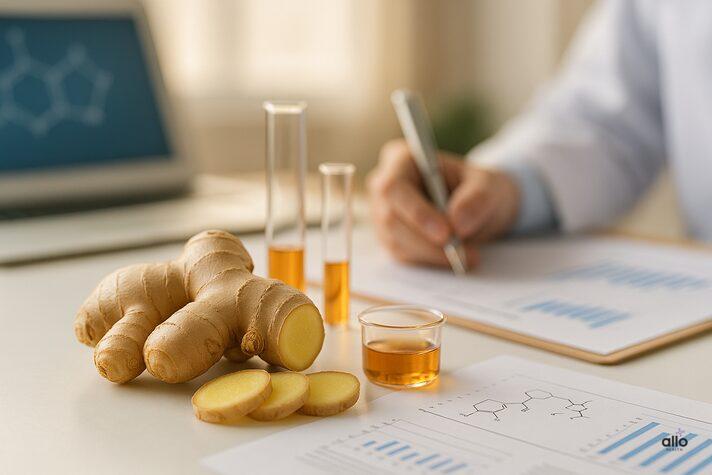
Ginger and Erectile Dysfunction: What Does Science Say?
Ginger may support sexual health and erections, but it’s not a cure for erectile dysfunction. Most of the research comes from animal studies, so more human clinical trials are needed to confirm how strong the link between ginger and erectile dysfunction really is.
- One small human study[6] using Alpinia galanga (from the ginger family) found that men taking 500 mg daily for four weeks had better erection scores (IIEF) than those on placebo.
- Another 2017 study[7] suggested that ginger root mixed with other herbs could help with ED, though it’s unclear how much of the benefit comes from ginger alone.
- Animal studies[8] using ginger with L-citrulline, muira puama, and paullinia cupana showed improved blood flow, reduced oxidative stress, and healthier sperm cells, with effects similar to tadalafil (Viagra).
In short, early results are promising, but more research is needed to confirm whether ginger is good for erectile dysfunction and how it affects testosterone production, sperm quality, and oxidative stress in humans.
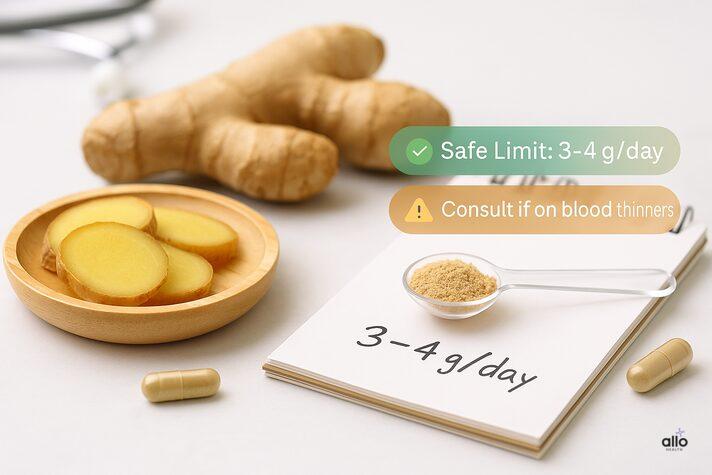
How to Use Ginger Safely For Erectile Dysfunction
Ginger is generally safe and well-tolerated when consumed in regular dietary amounts. For most people, adding it to food or drinks poses no issue. But moderation and awareness matter, especially if you’re considering it for erectile dysfunction or overall sexual health.
Possible Side Effects of Ginger:
When consumed in large amounts or supplements, ginger may cause:
- Heartburn
- Mouth irritation
- Diarrhea
- Increased bleeding risk
These effects are usually mild and temporary, but should still be noted, especially if you have other health conditions
Who Should Be Careful with Ginger
You should talk to your doctor before using ginger for ED if you have:
- Gallbladder disease – ginger can increase bile acid secretion.
- Bleeding disorders or are taking blood-thinning medications.
- Upcoming surgery – stop using ginger at least two weeks before your procedure.
- Allergies or hypersensitivity to ginger.
- Medical conditions requiring medications such as anticoagulants, diabetes drugs, or immunosuppressants, since ginger can interact with these.
How Much Ginger to Use for ED
While more research is needed to confirm the exact dosage for ginger and erectile dysfunction, current data gives some general guidance:
For healthy adults, up to 3-4 grams of ginger per day is considered safe[7].
Studies exploring ginger’s benefits have used various dosages and forms, including:
100 mg/kg per day of ginger powder in animal studies.
500 mg daily of Alpinia galanga (from the ginger family) in human trials.
2-4 g per day of ginger powder in general cardiovascular studies.
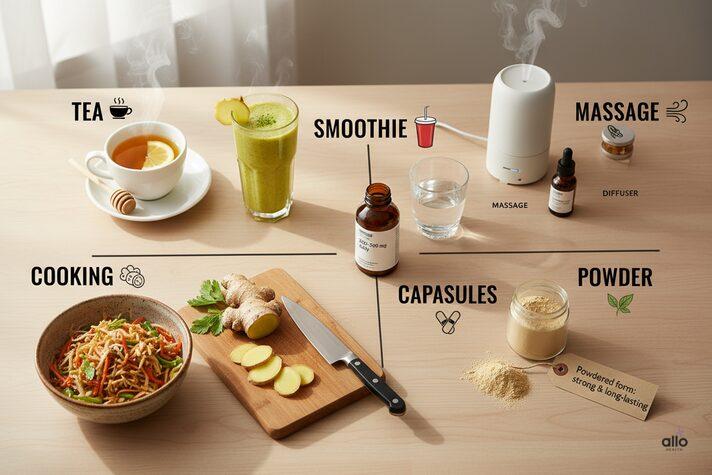
7 Ways to Incorporate Ginger in Your Diet for Erectile Dysfunction
Adding ginger to your daily routine doesn’t have to be complicated. Start with moderate amounts (1-2 grams daily) and see how your body responds. Here are some simple and effective ways to include ginger in your everyday life:
1. Ginger Tea
Slice some fresh ginger, steep it in hot water for a few minutes, and add a touch of honey or lemon. This soothing drink helps improve circulation and warms you up from the inside out.
2. Smoothies
Add a small piece of fresh ginger to your morning smoothie with fruits, spinach, and almond milk. It’s a quick, refreshing way to give your body a natural libido and energy boost.
3. Cooking
Grate or finely chop fresh ginger into your everyday dishes - stir-fries, soups, curries, or rice for extra flavor and wellness benefits. It enhances taste while supporting overall circulation and metabolic health.
4. Powdered Ginger
Dried ginger powder is more concentrated than fresh ginger and blends easily with foods. Sprinkle it into baked goods, milk, or spice mixes to enjoy its health-boosting properties.
5. Supplements
If fresh ginger isn’t practical, you can opt for ginger capsules or extracts (250–500 mg daily). Always check the quality and consult your doctor before starting any new supplement.
6. Ginger Shots
Juice fresh ginger with lemon and honey, or try ready-made ginger shots for a concentrated daily dose.
7. Massage Oil
Mix a few drops of ginger essential oil with a carrier oil like coconut or almond. This makes for a warming, sensual massage that can help ease stress and improve intimacy.
While ginger can support better blood flow and sexual wellness, its effects vary from person to person. To get the best results, combine it with lifestyle changes for ED like regular exercise, a balanced diet, good sleep, and stress management.

Bottom Line: Should You Try Ginger For ED?
When it comes to ginger and erectile dysfunction, this natural spice can be a great addition to your overall wellness plan, but it’s not a standalone cure.
Erectile dysfunction is a complex condition with multiple causes, from blood flow and hormones to stress and lifestyle. The best step forward is to get evaluated by a doctor and build a personalized treatment plan that fits your specific needs.
Using ginger as a complementary remedy, along with medical treatment, healthy eating, exercise, and stress management, may help improve circulation, energy, and overall well-being. But it should never replace professional medical care.
Disclaimer
The following blog article discusses food and diet-related information for general educational purposes. However, it is important to note that the information provided is not intended as personalized dietary advice and should not be considered a substitute for professional guidance from a registered dietitian or qualified healthcare professional. Before making any significant changes to your diet or nutrition plan, it is recommended to consult with a registered dietitian or healthcare professional. Dietary changes can have a significant impact on your overall health and well-being. It is important to approach any changes to your diet in a balanced and sustainable manner, ensuring that you meet your nutritional needs and avoid any potential nutrient deficiencies. Rapid or extreme changes in dietary patterns can be detrimental to your health and may require professional guidance. It is crucial to note that any specific dietary recommendations or guidelines mentioned in this article may not be appropriate for individuals with specific medical conditions, allergies, or intolerances. A registered dietitian or healthcare professional can provide individualized advice, including modifications or alternative food choices to accommodate your unique circumstances. The information provided in this article may not encompass all possible dietary considerations or account for the latest research and nutritional guidelines.
Most Asked Questions
Is garlic and ginger good for erectile dysfunction?
Yes, both garlic and ginger may support better blood flow and heart health — two key factors for stronger erections. Garlic helps relax blood vessels, while ginger reduces inflammation and improves circulation. Together, they can complement ED treatment, but they’re not a standalone cure.
What is the fastest way to cure erectile dysfunction?
There’s no instant cure for ED, but the fastest results often come from addressing the root cause. This may include using doctor-prescribed medicines (like sildenafil or tadalafil), improving diet, exercising, reducing stress, and quitting smoking. Natural options like ginger and lifestyle changes can help support recovery over time.
Does ginger raise testosterone?
Some animal studies suggest that ginger may increase testosterone levels by improving testicular blood flow and reducing oxidative stress. While this looks promising, more human research is needed. Still, adding ginger to your diet can be a healthy way to support overall hormonal balance and sexual health.
Do turmeric and ginger help with erectile dysfunction?
Yes, turmeric and ginger both contain powerful antioxidants that help reduce inflammation and support blood vessel health. This can indirectly improve erection quality. However, results vary between individuals, and they should be used alongside a balanced diet, regular exercise, and medical treatment when necessary.
How much ginger should I take daily for erectile dysfunction?
For most adults, 3–4 grams of ginger per day is considered safe. You can use it fresh, powdered, or in supplement form. Start with smaller doses (1–2 grams daily) and see how your body responds. Always consult your doctor if you take medications like blood thinners or diabetes drugs.
Sources
- 1.
Inhibition of erectile dysfunction-related enzymes by ginger (Zingiber officinale)-derived compounds: molecular docking and dynamics studies
- 2.
Treatment with a combination of ginger, L-citrulline, muira puama and Paullinia cupana can reverse the progression of corporal smooth muscle loss, fibrosis and veno-occlusive dysfunction in the aging rat
- 3.
Ginger (Zingiber officinale) dietary supplementation in mice regulates liver antioxidant defense systems in a dose- and age-dependent
- 4.
Ginger and Testosterone
- 5.
The influence of ginger (Zingiber officinale) on human sperm quality and DNA fragmentation: A double-blind randomized clinical trial
- 6.
Assessing the effect of Alpinia galanga extract on the treatment of SSRI-induced erectile dysfunction: A randomized triple-blind clinical trial
- 7.
Chapter 7The Amazing and Mighty Ginger
- 8.
Treatment with a combination of ginger, L-citrulline, muira puama and Paullinia cupana can reverse the progression of corporal smooth muscle loss, fibrosis and veno-occlusive dysfunction in the aging rat
- 9.
Ginger Root


